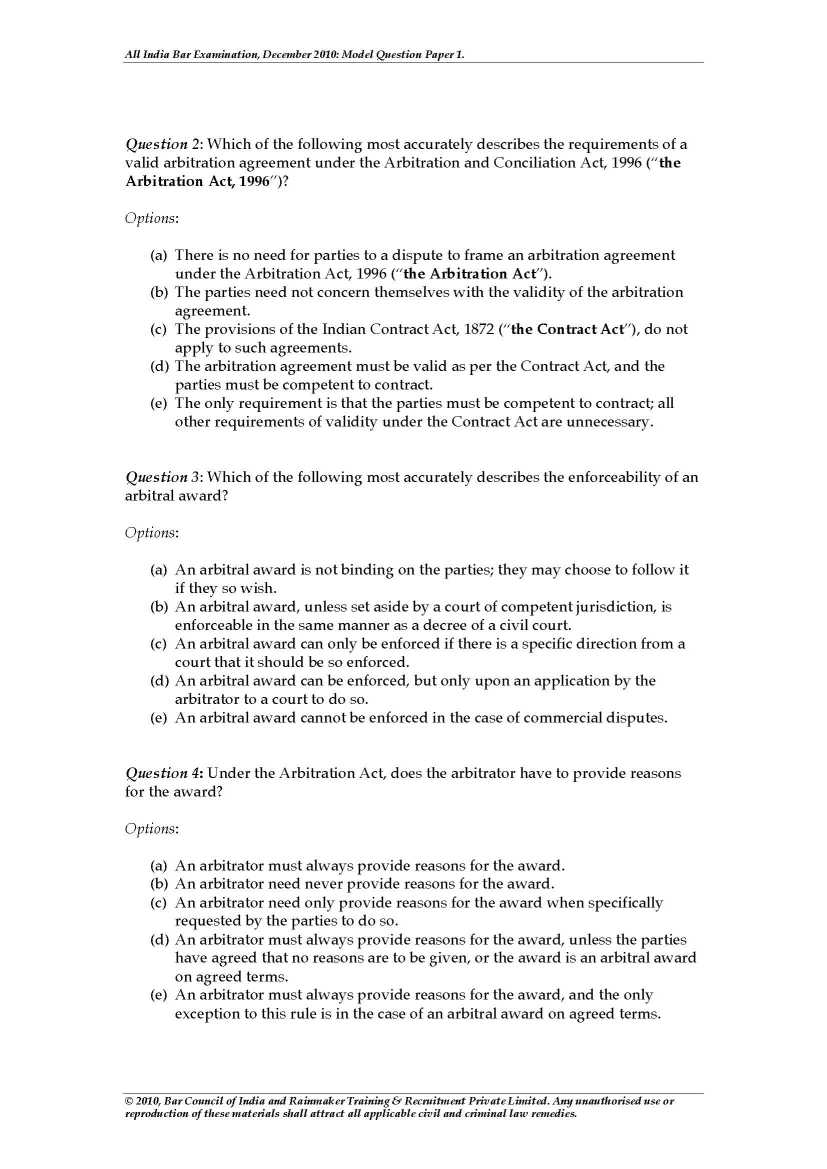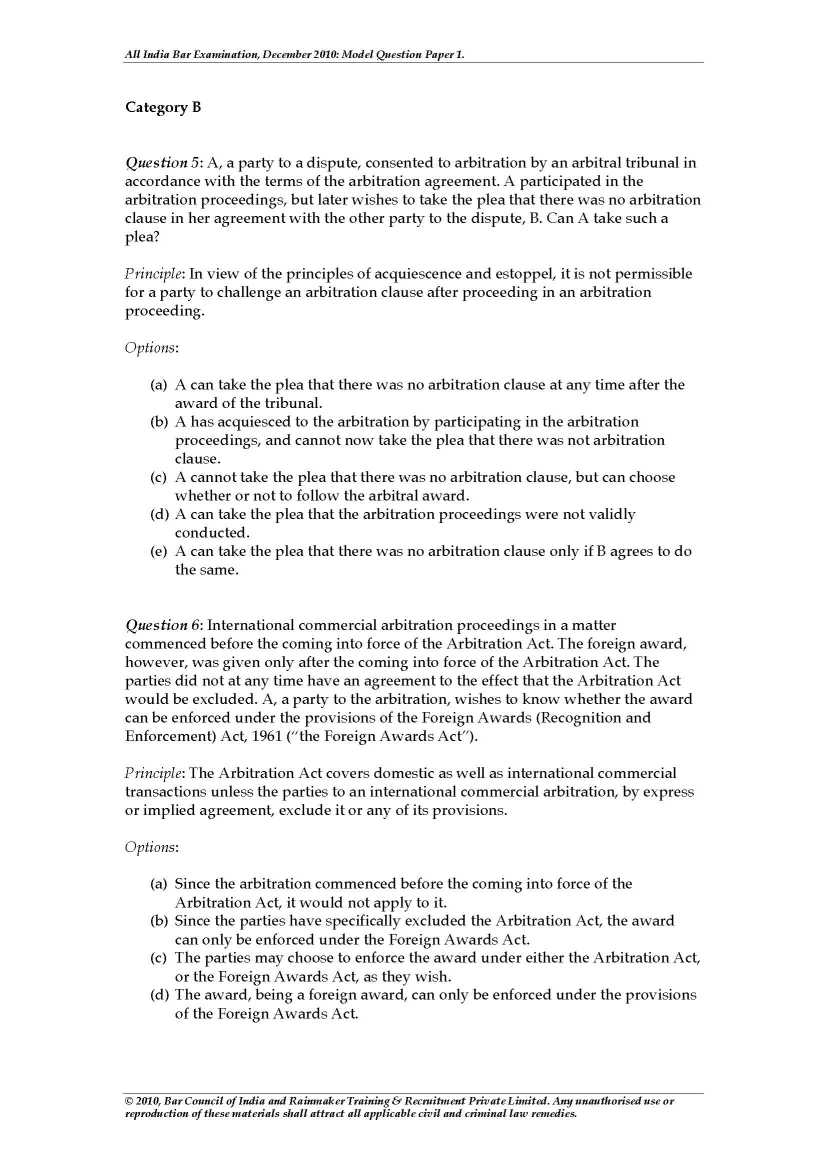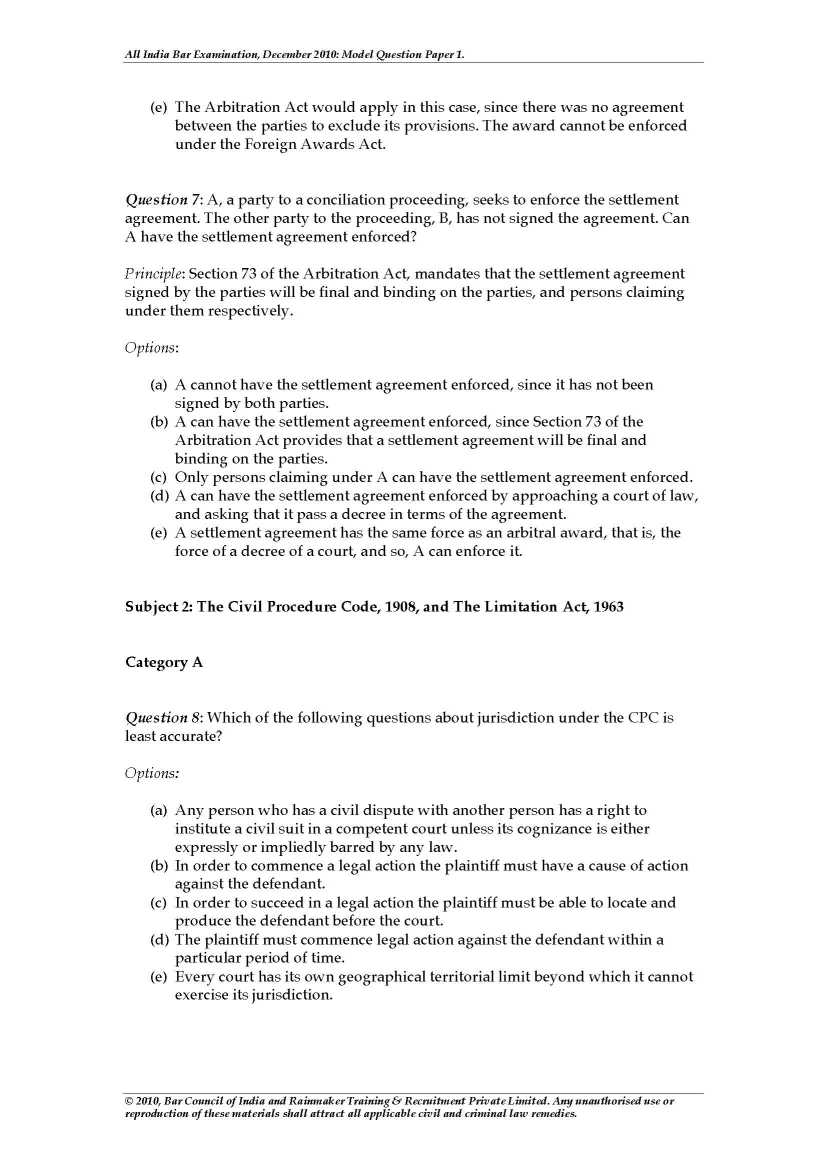| January 13th, 2018 04:02 PM | |
| Nitin Sharma | All India Bar Council Exam Model Question Paper in Tamil I am living in a town in Tamil Nadu. I am preparing for All India Bar Council Exam. I have only its syllabus. I need model question papers also. So tell me on which site I can download model question papers of All India Bar Council Exam? I am providing model question papers of All India Bar Council Exam for your reference: Model Question Paper for All India Bar Council Exam PART I Subject 1: Alternative Dispute Resolution Category A Question 1: Which provision of the Code of Civil Procedure, 1980 (“the CPC”) specifically provides for the settlement of disputes through alternative disputeresolution? Options: (a) There is no specific provision of the CPC providing for alternative disputeresolution. (b) The CPC as a whole provides for alternative dispute resolution. (c) Section 89 of the CPC expressly provides for settlement of disputes throughalternative dispute resolution. (d) It is not the CPC, but rather, the Arbitration Act of 1987 which is thegoverning law on alternative dispute resolution in the country today. (e) Section 5 of the CPC expressly provides for alternative dispute resolution. Question 2: Which of the following most accurately describes the requirements of avalid arbitration agreement under the Arbitration and Conciliation Act, 1996 (“theArbitration Act, 1996”)? Options: (a) There is no need for parties to a dispute to frame an arbitration agreementunder the Arbitration Act, 1996 (“the Arbitration Act”). (b) The parties need not concern themselves with the validity of the arbitrationagreement. (c) The provisions of the Indian Contract Act, 1872 (“the Contract Act”), do notapply to such agreements. (d) The arbitration agreement must be valid as per the Contract Act, and theparties must be competent to contract. (e) The only requirement is that the parties must be competent to contract; allother requirements of validity under the Contract Act are unnecessary. Question 3: Which of the following most accurately describes the enforceability of an arbitral award? Options: (a) An arbitral award is not binding on the parties; they may choose to follow itif they so wish. (b) An arbitral award, unless set aside by a court of competent jurisdiction, isenforceable in the same manner as a decree of a civil court. (c) An arbitral award can only be enforced if there is a specific direction from acourt that it should be so enforced. (d) An arbitral award can be enforced, but only upon an application by thearbitrator to a court to do so. (e) An arbitral award cannot be enforced in the case of commercial disputes Question 4: Under the Arbitration Act, does the arbitrator have to provide reasonsfor the award? Options: (a) An arbitrator must always provide reasons for the award. (b) An arbitrator need never provide reasons for the award. (c) An arbitrator need only provide reasons for the award when specificallyrequested by the parties to do so. (d) An arbitrator must always provide reasons for the award, unless the partieshave agreed that no reasons are to be given, or the award is an arbitral awardon agreed terms. (e) An arbitrator must always provide reasons for the award, and the onlyexception to this rule is in the case of an arbitral award on agreed terms. Category B Question 5: A, a party to a dispute, consented to arbitration by an arbitral tribunal inaccordance with the terms of the arbitration agreement. A participated in thearbitration proceedings, but later wishes to take the plea that there was no arbitrationclause in her agreement with the other party to the dispute, B. Can A take such aplea? Principle: In view of the principles of acquiescence and estoppel, it is not permissiblefor a party to challenge an arbitration clause after proceeding in an arbitrationproceeding. Options: (a) A can take the plea that there was no arbitration clause at any time after theaward of the tribunal. (b) A has acquiesced to the arbitration by participating in the arbitrationproceedings, and cannot now take the plea that there was not arbitrationclause. (c) A cannot take the plea that there was no arbitration clause, but can choosewhether or not to follow the arbitral award. (d) A can take the plea that the arbitration proceedings were not validlyconducted. (e) A can take the plea that there was no arbitration clause only if B agrees to dothe same. All India Bar Council ExamModel Question Paper     |